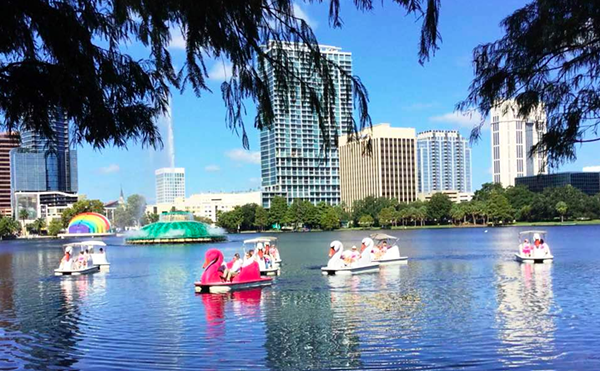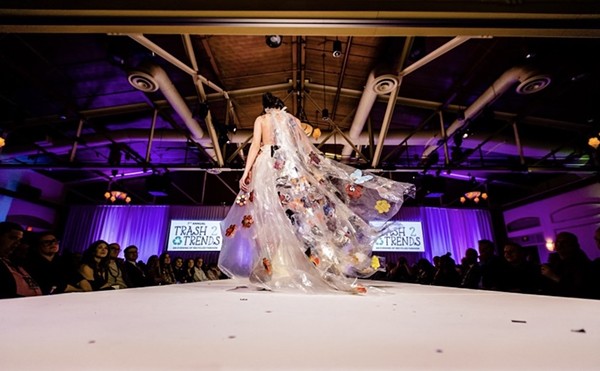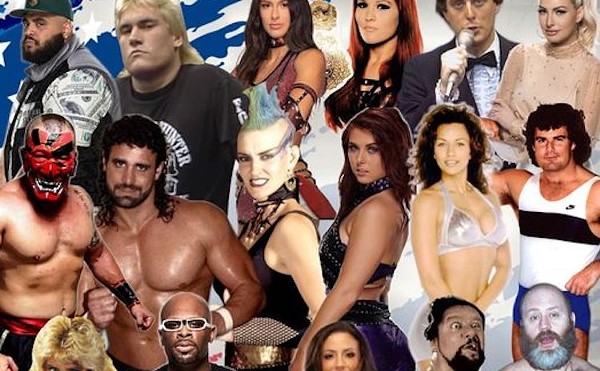I'm not certain the first time I heard it. Perhaps it was when Mayor Buddy began touting the land where the arena currently sits as the future home for a "creative village" dedicated to "digital media." Maybe it was from Florida Creatives, a tech-oriented networking community run locally by Ryan Price. But suddenly it seemed software engineers and web-heads everywhere decided to start referring to themselves as "creative," a descriptor traditionally dedicated to the analog artists and performers among us.
I live between the two worlds: database designer by day, theater creator and critic by night, heavy sleeper on alternate Sundays. While there's a touch of artistry in assembling an efficient SQL statement, I've never imagined finding anything creatively fulfilling in the hours I spend staring at computer code. Where do these techies get off, I'd sneer to myself, comparing what they do to real creativity?
Not for the first time, I'm here to tell you I was wrong. I now understand how much the artists in Orlando and elsewhere have to learn from the nerds about innovation and inspiration. What turned me around? March 4's Ignite Orlando event, the most entertainingly educational evening I've experienced in months.
The first Ignite event was held in Seattle in 2006, and the format is simple: Each speaker gives a five-minute PowerPoint presentation — 20 slides changed every 15 seconds, no more or less — on any topic they want. Topics are usually technocentric, but run an eclectic range; the only requirement is that the speaker be passionate about the subject. The format has since spread around the world.
Orlando has joined the ranks of Ignite-aware cities, thanks to the efforts of organizer Dan Kinchen of One Step Solutions Internet consulting and volunteer emcee-evangelist Gregg Pollack of the Rails Envy programming podcast. Together with Wall Street Plaza's Slingapour's, who graciously opened their doors to host the Wednesday event, they assembled an audience as eccentric as any I've seen in any local gallery or theater of late. Case in point: The one familiar face was performance artist Brian Feldman, whose text-messaging obsession dovetails perfectly with the presenters' recurring topic of social media technology.
I was afraid that much of the material would sail over my head, but the speakers' enthusiasm and the fast-moving format kept almost everything accessible, if not entirely understood. And just when we were getting antsy, there was a midevent break for a Make Project contest, organized by Tyler Hunt. Participants broke into groups of five to construct a DIY project within time and material limitations — teams were given drinking straws, paper clips, Scotch tape and an hour to construct a weight-bearing bridge. Some teams produced canting contraptions that collapsed into bird nests under the load of two rolls of pennies; other devised reinforcing airbags from the packaging for supplies that held up surprisingly well. I passed on participation and instead stood at the bar listening to engineering geeks debate load distribution. Victory was claimed by an elegant cantilevered design that suspended $10 in change and a half-dozen iPhones, but Feldman's team earned an honorable mention for creating a Twitter page to document the bridge's development.
The presentations themselves were too breathlessly dense for me to do justice to them in this space, but here's a sampling from the 17 speakers:
l Derek Gallo debated the merits of Facebook, OpenID and other customizable social networking platforms, eventually directing nontechies to Google Friend Connect.
l Eric Marden expounded on the impact of Twitter, "the parlor game with one rule `the 140-character text message length limit` and infinite variations," exploring concepts like "unforced reciprocity," "ambient awareness," and "asynchronous attention." Old media beware: In a world of social media filters and netizen journalism, "if it didn't bubble up on Twitter, it didn't happen."
l Greg Rollett explained how new media is building communities that "make Orlando cool(er)," giving props to Mark Baratelli's Daily City (thedailycity.com) and the Sentinel's blogs. (Guess OW don't rate.) Who knew Ichiban accepts sushi orders via Twitter?
l John Todero advocated for CoLab, the "co-working" shared office space in downtown's historic Angebilt building: reasonable rent, creative cross-pollination and free coffee.
l Cory Collier delivered a profane and profound lecture on going freelance in a freefalling economy, including tips like "Build trust in a person at the bar, not on Facebook" and "Don't even look at your Xbox, asshole."
l Matthew Williams told us how, with an $80 starter kit from Heart's Homebrew Supply, you can have a flowing supply of beer. Sweet!
In the final planned speech of the evening, Anthony Eden tried to open our eyes to "the lies we tell ourselves" — lies about being unable to get healthy, get organized, get work we care about. Admitting that "I can't" is really "I won't" is the first step toward "I will." He was followed by an improvised exhortation on the importance of failing over and over again. Both are mantras all creatives should memorize, no matter what form their art takes.
[email protected]















